Methought - March/2025
Monthly wrap-up: rereading Dostoevsky, memory's power in Camus and Rohrwacher, 17th century women writers, Zweig's obssessive young men, and HAIM released a song - nature is healing
scroll down to read the English version
Caros leitores,
Muitas mudanças aconteceram em março, e eu fico tentada a culpar a astrologia devido a uma combinação de mercúrio e vênus retrógrado e o início da temporada de áries (pelo menos é o que os astrólogos no tiktok falaram). Assisti filmes demais esse mês o que me deu trabalho para escrever essa newsletter. A cada mês que passa eu me faço a promessa de ser mais organizada, mas nem vou prometer isso para abril visto que nunca estive tão próxima de ser Frances Ha (um dos filmes que revi esse mês). Como é dificil ser adulto, ainda bem que eu sei me divertir, tipo escrever para essa newsletter.
O poema do mês é o mais famoso de Frank O’Hara—que tem bons motivos para a fama—e que reli obsessivamente em março tentando fazer meu segundo conto funcionar (existem conexões entre Frank e meu narrador que vocês só saberão daqui a muito, muito tempo):
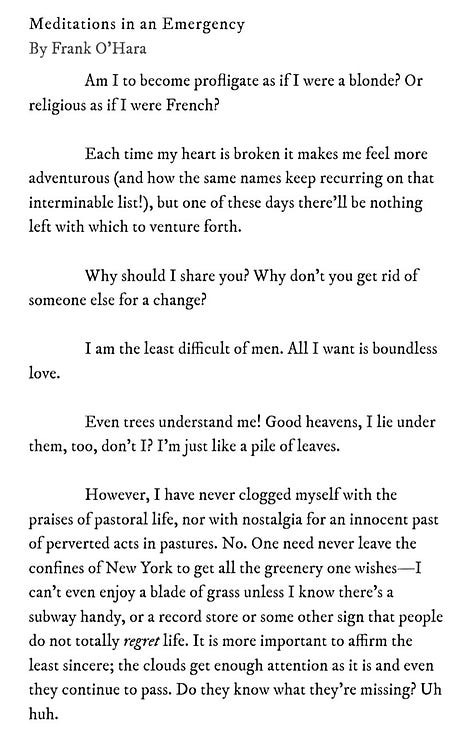
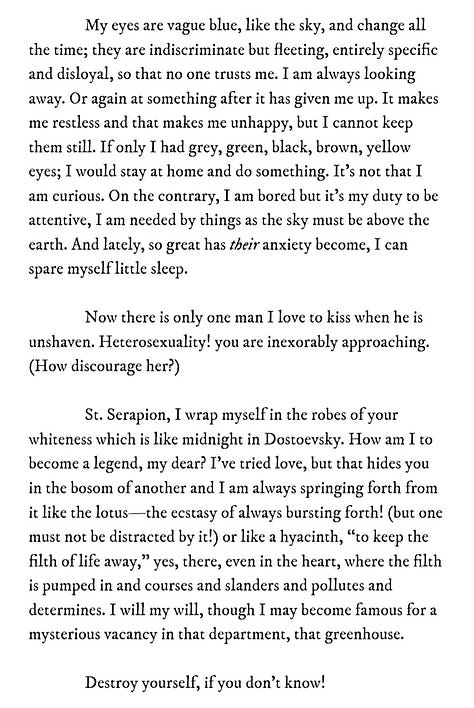
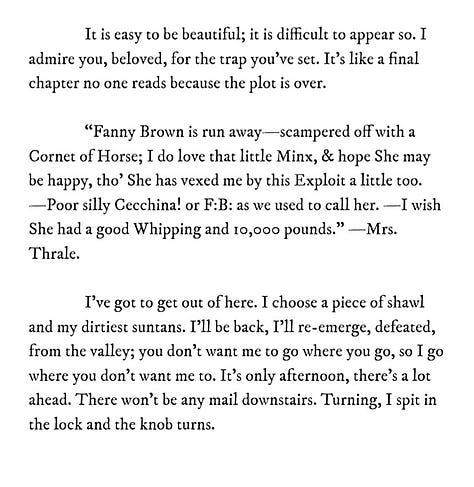
LIVROS &TC.
Memórias do Subsolo - Fiodor Dostoiévski (1864)
O Homem do Subsolo é um homem inamável por uma deformidade espiritual que ele mesmo causou e manteve. Próximo ao final da novela, ele define o amor como “tiranização e demonstração de superioridade moral”—essa afirmativa revela que ele não é amável pois, devido à sua admitida vaidade, não pode ser “submetido” ao seu próprio conceito de amor. Esse é um dos aspectos que demonstram como o subsolo no qual ele vive é totalmente fruto de sua criação, tornando este homem um dos personagens mais fascinantes e desprezíveis da literatura (e ainda assim o livro consegue ser muito engraçado).
A forma que a crença individual pode interferir na realidade a ponto de distorce-la completamente é outro elemento fascinante da narrativa de Dostoiévski. Será que Zverkov, Simonov e os outros estavam realmente tentando humilhar o homem do subsolo, ou será que todas as suas percepções já estão tão tingidas por seu rancor e vaidade que a conversa cotidiana se transforma em insultos? Quando se espera humilhação, é fácil ser humilhado; quando se quer ser ofendido, é fácil se ofender—a narração não confiável faz com que o leitor questione o quanto desse sofrimento exarcebado é fruto da mente doente do homem do subsolo. Suas constantes admissões de mentiras servem como defesa, garantindo que ele nunca exponha muito de si mesmo.
O sofrimento descrito por ele não é mero masoquismo, mas uma forma calculada de egoísmo. Ele não sofre pelos outros, mas para atormentar os outros com esse sofrimento, pois isso lhe causa um prazer torpe. No mundo de Dostoiévski, o desejo do homem do subterrâneo de confessar e se humilhar parece natural, mas por trás dessa vulnerabilidade está um egoísmo mais profundo—uma necessidade de permanecer impenetrável. Tudo isso é escrito com grande genialidade, não é a toa que é um dos meus livros favoritos.
Confusion - Stefan Zweig (1926)
Confusion é uma excelente novela cujo tema poderia se resumir em paixão: o que acontece quando a paixão intelectual e a carnal se entrelaçam a ponto a serem indistinguiveis? Obsessão e desejo proibido é o que une Roland e seu professor (sem nome) de literatura inglesa, o que os leva a iniciar uma relação intensa e conturbada ao longo de um semestre numa universidade no interior da Áustria.
Possuido por uma forte admiração por esse professor, cuja reciprocidade é a princípio ambígua, Roland se coloca inteiramente a seu serviço para que ele conclua a obra de sua vida: um volume imenso sobre a história do Globe Theatre e o teatro Elisabetano. O desejo faustiano de Roland pelo conhecimento que esse professor pode fornecer atinge um limite metafísico, deixando-o angustiado quando tenta manifestá-lo fisicamente:
“For if one feels reverent passion even of a pure nature for a woman, it unconsciously strives for physical fulfilment; nature has created an image of ultimate union for it in the possession of the body—but how can passion of the mind, offered by one man to another and impossible to fulfil, ever find complete satisfaction?”
Provavelmente deu para perceber os subtons homossexuais nesse questionamento, e de fato, há algo a lá E.M. Forster acontecendo nesse livro, cujo final emocionalmente amargo me fez chorar.
The Blazing World - Margaret Cavendish (1666)
Essa foi uma leitura bem estranha. The Blazing World é ao mesmo tempo completamente maluco e extremamente entediente. Escrito em 1666 por Margaret Cavendish, a Duquesa de Newcastle, é um dos primeiros exemplos que temos da literatura de ficção científica. Os detalhes sobre o livro, quem o escreveu e seu contexto de publicação são muito mais interessantes do que o livro em si. A narrativa conta a história de uma jovem dama que é raptada e vai parar nessa realidade paralela chamada Blazing World. Nesse mundo desconhecido, ela é recebida por espíritos e híbridos de animais e humanos — homens-leopardo, homens-urso, homens-raposa — e acaba se casando com o imperador. Agora imperatriz, ela embarca em uma missão para estudar, entender e reformar seu novo reino através de investigações científicas, filosóficas e teológicas.
Mas a sinopse chamativa esconde um livro terrivelmente chato em sua forma — não há diálogos e ao menos um terço dele consiste em descrições intermináveis. Como The Blazing World é produto de uma época na qual o Romance ainda não tinha se desenvolvido completamente (levaria ao menos 100 anos para isso), eu posso perdoar os defeitos, mas não recomendo a leitura (a não ser que você seja motivado por um grande interesse histórico).
ARTIGOS, ENSAIOS, PALESTRAS &TC
Return to Tipasa - Albert Camus (1952)
Tudo que é sobre nostalgia ou memória provavelmente vai me emocionar. Esse ensaio de Camus é, de verdade, uma das coisas mais bonitas que já li. Até então só tinha lido O Mito de Sísifo, e esse texto é bem diferente; é lírico e ligeiramente vago, tem um subtexto político-filosófico mas no fim das contas não é sobre isso. É o tipo de texto que tem uma mensagem reconfortante mas melancólica, e que me faz querer nunca esquecer que ele existe para que eu possa sempre revisitá-lo quando necessário. Acho que ele muda de sentido conforme o contexto de vida do leitor. Queria memorizar esse ensaio inteiro e poder aterrorizar as pessoas recitando-o do nada, por pura necessidade de que os outros escutem o que Camus disse. Você pode ler um trecho belíssimo para eu não ter que te submeter a isso:
Originally brought up surrounded by beauty which was my only wealth, I had begun in plenty. Then had come the barbed wire–I mean tyrannies, war, police forces, the era of revolt. One had had to put oneself right with the authorities of night: the day's beauty was but a memory. And in this muddy Tipasa the memory itself was becoming dim. It was indeed a question of beauty, plenty, or youth! In the light from conflagrations the world had suddenly shown its wrinkles and its wounds, old and new. It had aged all at once, and we with it. I had come here looking for a certain "lift"; but I realized that it inspires only the man who is unaware that he is about to launch forward. No love without a little innocence. Where was the innocence? Empires were tumbling down; nations and men were tearing at one another's throats; our hands were soiled.
There’s no good reason to love each other – and that’s a relief — John Kaag para a Psyche Magazine (2025)
“Love is not a matter of debt and exchange”. Esse pequeno ensaio examina a falsa ideia de que o amor está atrelado a significados e coisas mensuráveis. O autor, após uma epifania que chegou bruscamente para combater crenças equivocadas, compara amar a um ato de fé, pois é uma crença e uma entrega “ilógica” e" “desmotivada”, no bom sentido. Se ama porque sim, por um conjunto de razões indefinidas que culminam apenas em sentimentos e essências que não podem ser catalogadas e contabilizadas (ou até podem, mas seriam motivos superficiais). Pensar diferente disso pode acarretar numa vida de relacionamentos frustrados, tal qual ele relata:
I guess I thought – for a very long time – that there was a very good reason to love one another. And this belief also made me think that the point of life was to make oneself lovable. I would go to the gym – to be lovable. I would write great books – to be loveable. And I would hold myself together, as best as humanly possible – to be loveable. Of course, I should have known that this was a largely futile project. At the end of the (very long) day, I felt out of shape, ugly, poor and vulnerable. Probably, at root, because I had the misguided belief that the question ‘Why do you love me?’ could have an adequate answer.
Conspiracy - Videoessay da Contrapoints
A este ponto eu acho que confiaria em Natalie (a Contrapoints) com a minha vida. Sempre que ela posta seu vídeo anual eu paro tudo que estou fazendo para assistir (o meu favorito é sobre Inveja, que curiosamente me incentivou a ler Nietzsche). O tema desse é tristemente relevante para o atual cenário político; por mais que nesse vídeo ela prove que teorias da conspiração sempre existiram com força, é inegável que a internet piora esse cenário dez mil vezes mais. Eu sei que não existe verdade (uma visão relativista que aprendi na faculdade de direito), mas não precisavamos viver no meio do teatro do absurdo. Esse vídeo me deprimiu um pouco mas é importantíssimo assistir:
Her blazing world - Francesca Peacock para a Aeon Magazine (2024)
Embora eu não tenha gostado do livro de Margaret, como escritora e figura histórica, ela é extremamente interessante. Tal como vários autores que encontrei ao longo de minha vida, acho muito mais interessante pensar e ler sobre sua obra do que ler a obra em si. Neste artigo simples e informativo, é possível aprender mais sobre a vida extraordinária de Margaret — desde ser vítima de violência durante a Revolução Inglesa até quase morrer em um navio enquanto acompanhava a Rainha Henrietta no exílio — e faz com que o leitor admire seu atrevimento ao publicar vinte e três livros durante sua vida usando seu próprio nome e escrevendo sobre assuntos “masculinos”, como filosofia, matemática, teologia e política.
FILMES & SÉRIES
The White Lotus: 3ª temporada - Mike White (2025)
Estou escrevendo isso logo depois de ter visto o season finale e, infelizmente, foi bem decepcionante. Metade dos acontecimentos foram previsíveis e a outra metade ficou sem resolução. Eu já vinha achando essa temporada mais fraca do que as duas anteriores, mas os últimos episódios me deram esperança de que o desfecho pudesse compensar o começo meio sem graça. Porém, gostei muito do paralelo traçado entre Belinda e Tanya; Mike White gosta de mostrar que a linha entre vilão e vítima é traçada apenas pela oportunidade certa. Apesar do desgosto, continuo adorando a série — e, se você nunca viu, a primeira temporada é simplesmente impecável.
Drop Dead Gorgeous - Michael Patrick Jann (1999)
Adoro mockumentaries e esse estilo de comédia anos 90 é muito meu tipo de filme. Ótimas piadas (mesmo que mais da metade fosse ser cancelada hoje por ser politicamente incorreto), ótimo figurino e ótimas atrizes — Allison Janney você É a maioral. Não sei como Jennifer Coolidge não ta aqui, esse filme tem 100% a energia dela.
La Chimera - Alice Rohrwacher (2023)
Um dos filmes mais bonitos que já vi. Cada cena é mágica e etérea e transparece o cuidado aos detalhes. Josh O’Connor interpreta um arquétipo de Orfeu, cujo dom de encontrar objetos perdidos e esquecidos transforma uma história de roubo a princípio vulgar em algo nobre e feérico. Gosto de como o passado milenar da Italia ressurge o tempo todo; é um país que se resume a um amontoado de ruinas das quais o presente não consegue escapar. O contraste entre o avanço industrial e a herança mística é um tema muito bem explorado pela diretora, e acho difícil alguem superar La Chimera nesse quesito.
Burning - Lee Chang-dong (2018)
Eu tinha a expectativa de amar esse filme e não foi o caso. Pelo contrário, achei uma grande decepção e quando descobri ser baseado num conto de Murakami tudo fez sentido. Achei boa parte da história desproposital; é como se a narrativa falhasse em transmitir o senso de importância daqueles personagens. Achei que a suposta crítica à objetificação feminina na verdade reforça essa objetificação, tal como uma paródia que se torna o próprio objeto parodiado. O final não tem o impacto necessário pois a construção da tensão até lá é entediante e sem substância.
Frances Ha - Noah Baumbach (2012)
Esse é um dos meus filmes favoritos, e eu não o revia desde a pandemia (2020? 2021?). Assistir a Frances Ha me faz sentir em paz, de certa forma. Não tenho nada a ver com ela (sou infinitamente mais organizada e prática, por exemplo), mas é impossível não se identificar com Frances. O desejo meio inocente que ela tem de perseguir os próprios sonhos é adorável e me dá esperança. Muitas vezes, parece que ser adulto é ter que escolher entre uma fonte de renda estável e a felicidade. Mas a história de Frances faz isso parecer menos horrível e absoluto. O final do filme, para mim, mostra que o futuro não é uma sentença, e, para quem está passando por uma fase muito parecida com a dela, é bom lembrar disso.
Small Things Like These - Tim Mielants (2024)
Assisti no cinema por adorar o livro, mas devo dizer que não foi uma boa adaptação. A beleza do livro de Claire Keegan está na narração interior de Furlong (Cillian Murphy) e o filme não conseguiu transmitir isso. Existem muitos silêncios nos quais a câmera foca no rosto deprimido de furlong e que, depois de um tempo, parecem apenas uma incerteza dos realizadores de como comunicar o texto de Keegan para as telas. Além disso, o horror e o conflito envolvendo as freiras ficou meio vago; assisti com meu namorado que não tinha lido o livro e tive que contextualizar ele depois. Triste pois eu esperava mais.
Inside Llewyn Davies - Joel Coen, Ethan Coen (2013)
Nunca mais tinha passado tanta raiva vendo um filme e digo isso no bom sentido. Llewyn Davies é um aspirante a cantor folk que não tem casa nem dinheiro e eu o odeio — da metade do filme pra frente eu já estava torcendo contra ele. Mas nem precisei torcer pois Inside Llewyn Davies se resume a uma odisseia de desgraças cômicas e patéticas que acontecem com este personagem e, na minha opinião, ele merece a grande maioria delas.
Another Woman - Woody Allen (1988)
Os filmes que Allen fez nas décadas de 1970 e 1980 são os melhores de sua carreira. Para além de Annie Hall ou Manhattan, temos Interiors, Love and Death, Hannah and Her Sisters e Another Woman — todos excelentes e que atestam a habilidade de Allen em escrever roteiros, mesmo que essa habilidade já tenha se esvaído há muito tempo. Eu estava curiosa para assistir a Another Woman, pois Gena Rowlands, minha atriz favorita, é a protagonista, interpretando uma escritora cujo apartamento vizinho a um consultório psiquiátrico permite que ela escute as consultas, deixando-a obcecada por uma paciente em particular. É um filme sobre arrependimento e sobre como o passado nunca pode ser completamente superado — resquícios ainda ditam o presente. Não é um drama trágico como Interiors, mas mostra o que acontece quando se vive numa ilusão sobre si memso.
Heathers - Michael Lehmann (1989)
Gostei muito mais desse filme do que eu esperava. Hilário, cínico, inteligente e grandes figurinos. Provavelmente uma das melhores high school comedies que Hollywood já fez. Quem diria que uma epidemia de assassinatos disfarçados de suicídio poderia ser tão engraçado? Te amo Winona Ryder.
MÚSICA & PODCASTS
The Master (trilha sonora do filme) - Jonny Greenwood
Eu gosto de ter sempre uma música de fundo tocando enquanto escrevo, mas não pode ser muito complexa nem agitada, nem lenta demais para não me dar sono. Normalmente, trilhas sonoras de filmes funcionam bem nessa função. A de Phantom Thread é a minha favorita de todos os tempos, e recentemente resolvi explorar o resto do trabalho de Jonny Greenwood (ele é o guitarrista de Radiohead para quem não sabia). As músicas do filme The Master são intensas e sofisticadas, e me deixam num ótimo humor para escrever. Espero ver mais parcerias entre Paul Thomas Anderson e Jonny…
Older (and Wiser) - Lizzy McAlpine (2024)
Sempre gostei de algumas músicas de Lizzy McAlpine mas nunca tinha parado para escutar um álbum todo dela até esse lançamento. É no mesmo estilo de Soccer Mommy e Alice Phoebe Lou, duas que também adoro. Minhas favoritas do Older (and Wiser) são: Spring into Summer; Pushing It Down and Praying; All Falls Down; I Guess;
Relationships - HAIM (2025)
Tenho certeza que você viu uma menina de franja/microtattoos/sobrancelha descolorida postando essa música nos stories do instagram no dia que o HAIM lançou (eu mesma fui uma delas). Nature is healing. Passei dias com “fucking relationships…” na minha cabeça. O vídeo é uma obra cinematográfica:
Until the World is Mended | A Reflection On J.R.R. Tolkien - Professing Literature Podcast
Esse episódio faz um apanhado da obra de Tolkien e examina significados morais e poéticos em O Senhor dos Anéis. Foi uma discussão muito bonita e nos que convida a enxergar a profundidade dos livros para além de uma história de aventura e fantasia. Vou reler A Sociedade do Anel em breve e esse episódio foi um grande motivador. Com certeza ouvirei mais desse podcast.
Dear readers,
A lot of changes happened in March, and I'm tempted to blame astrology since we had a combination of Mercury and Venus retrograde and the start of Aries season (at least that's what the astrologers on TikTok said). I watched too many films this month, which made it hard for me to write this newsletter. Every month I promise to myself I’ll be more organised, but I'm not even going to promise that for April since I've never been so close to being like Frances Ha (one of the films I rewatched this month). How difficult it is to be an adult, but I'm glad I know how to have fun, like writing for this newsletter.
The poem of the month is the most famous one by Frank O'Hara—which has good reason to be famous—and which I reread obsessively in March trying to make my second short story work (there are connections between Frank and my narrator that you won't know for a long, long time):
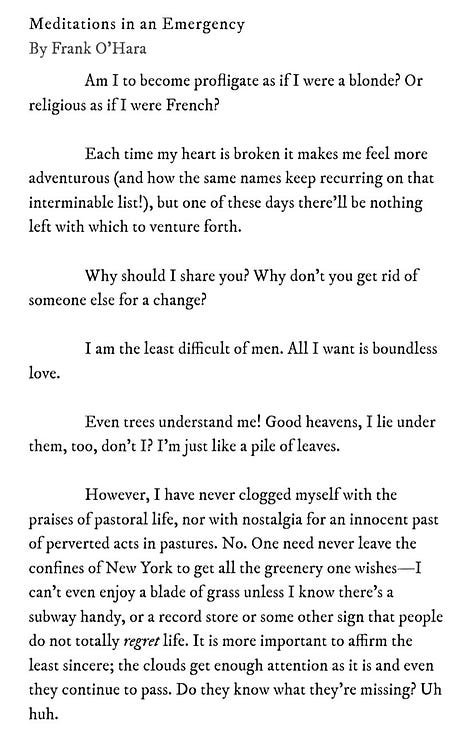
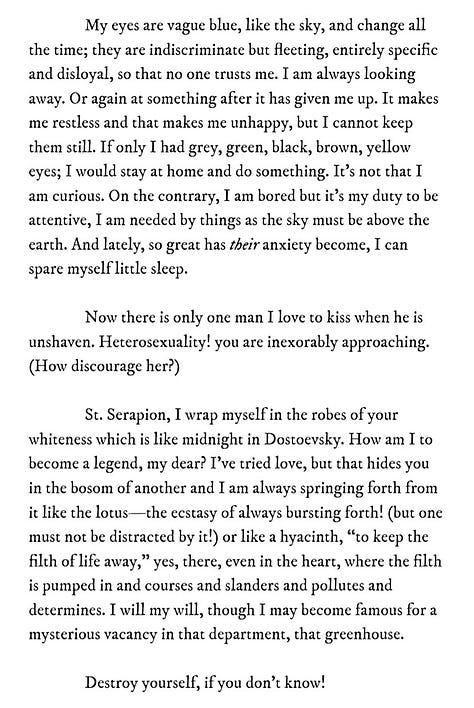
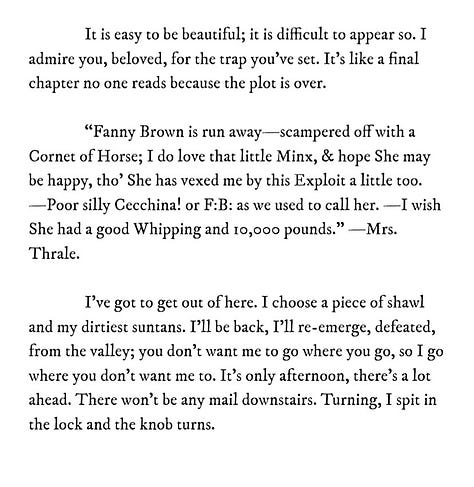
BOOKS &TC.
Notes from the Underground - Fyodor Dostoevsky (1864)
The Underground Man is unlovable because of a spiritual deformity that he himself caused and maintained. Towards the end of the novella, he defines love as ‘tyrannising and demonstrating moral superiority’—this statement reveals that he is unlovable because, due to his self-avowed vanity, he cannot be “subjected” to his own concept of love. This is one of the aspects that shows how the underground in which he lives is entirely of his own creation, making this man one of the most fascinating and despicable characters in literature (and yet the book manages to be very funny).
The way in which individual belief can interfere with reality to the point of completely distorting it is another fascinating element of Dostoevsky's narrative. Were Zverkov, Simonov and the others really trying to humiliate the underground man, or are all his perceptions already so tainted by his resentment and vanity that everyday conversation turns into insults? When you expect humiliation, it's easy to be humiliated; when you want to be offended, it's easy to be offended—the unreliable narration makes the reader question how much of this exaggerated suffering is the result of the underground man's sick mind. His constant admissions of lies serve as a defence, ensuring that he never exposes too much of himself.
The suffering he describes is not mere masochism, but a calculated form of selfishness. He doesn't suffer for others, but to torment others with that suffering, because it gives him a twisted pleasure. In Dostoevsky's world, the underground man's desire to confess and humiliate himself seems natural, but behind this vulnerability lies a deeper selfishness—a need to remain impenetrable. All this is written with great genius, no wonder it's one of my favourite books.
Confusion - Stefan Zweig (1926)
Confusion is an excellent novella whose theme could be summarised as passion: what happens when intellectual and carnal passion intertwine to the point of being indistinguishable? Obsession and forbidden desire unite Roland and his (unnamed) professor of English literature, leading them to start an intense and turbulent relationship over the course of a semester at a small German university.
Possessed by a strong admiration for this professor, whose reciprocity is at first ambiguous, Roland puts himself entirely at his service to complete his life's work: an immense volume on the history of the Globe Theatre and Elizabethan theatre. Roland's Faustian desire for the knowledge that this professor can provide reaches a metaphysical limit, making him anxious when he tries to physically manifest it:
“For if one feels reverent passion even of a pure nature for a woman, it unconsciously strives for physical fulfilment; nature has created an image of ultimate union for it in the possession of the body—but how can passion of the mind, offered by one man to another and impossible to fulfil, ever find complete satisfaction?”
You can probably see the homosexual undertones in this enquiry, and indeed, there is something very E.M. Forster about this book, whose emotionally bitter ending made me cry.
The Blazing World - Margaret Cavendish (1666)
This was a very strange read. The Blazing World is both completely crazy and extremely boring. Written in 1666 by Margaret Cavendish, the Duchess of Newcastle, it is one of the first examples we have of science fiction literature. The details about the book, who wrote it and its publication context are much more interesting than the book itself. The narrative tells the story of a young lady who is kidnapped and ends up in this parallel reality called the Blazing World. In this unknown world, she is welcomed by spirits and hybrids of animals and humans - leopard men, bear men, fox men - and ends up marrying the emperor. Now empress, she embarks on a mission to study, understand and reform her new kingdom through scientific, philosophical and theological investigations.
But the captivating synopsis hides a book that is terribly dull in its form - there are no dialogues and at least a third of it consists of endless descriptions. As The Blazing World is a product of a time when the Novel had not yet fully developed (it would take at least 100 years for that to happen), I can forgive the flaws, but I don't recommend reading it (unless you are motivated by a great historical interest).
ARTICLES, ESSAYS, LECTURES &TC
Return to Tipasa - Albert Camus (1952)
Anything about nostalgia or memory is likely to make me emotional. This essay by Camus is truly one of the most beautiful things I've ever read. Until then I'd only read The Myth of Sisyphus, and this text is quite different; it's lyrical and slightly hazy, it has a political-philosophical subtext, but ultimately it's not about that. It's the kind of text that has a comforting but melancholy message, and that makes me never want to forget that it exists so that I can always revisit it when necessary. I think it changes meaning according to where the reader is in life. I wish I could memorise this entire essay and terrify people by reciting it out of the blue, out of sheer need for others to hear what Camus said. You can read a beautiful passage so I don't have to put you through that:
Originally brought up surrounded by beauty which was my only wealth, I had begun in plenty. Then had come the barbed wire–I mean tyrannies, war, police forces, the era of revolt. One had had to put oneself right with the authorities of night: the day's beauty was but a memory. And in this muddy Tipasa the memory itself was becoming dim. It was indeed a question of beauty, plenty, or youth! In the light from conflagrations the world had suddenly shown its wrinkles and its wounds, old and new. It had aged all at once, and we with it. I had come here looking for a certain "lift"; but I realized that it inspires only the man who is unaware that he is about to launch forward. No love without a little innocence. Where was the innocence? Empires were tumbling down; nations and men were tearing at one another's throats; our hands were soiled.
There’s no good reason to love each other – and that’s a relief — John Kaag para a Psyche Magazine (2025)
“Love is not a matter of debt and exchange”. This short essay examines the false idea that love is tied to meanings and measurable things. The author, after an epiphany that came abruptly to combat misconceptions, compares loving to an act of faith, because it is an ‘illogical’ and ‘unmotivated’ belief and surrender, in a good way. You love because you do, for a set of undefined reasons that culminate only in feelings and essences that cannot be catalogued and accounted for (or they can, but they would be superficial reasons). Thinking otherwise can lead to a life of frustrated relationships, just as he says:
I guess I thought – for a very long time – that there was a very good reason to love one another. And this belief also made me think that the point of life was to make oneself lovable. I would go to the gym – to be lovable. I would write great books – to be loveable. And I would hold myself together, as best as humanly possible – to be loveable. Of course, I should have known that this was a largely futile project. At the end of the (very long) day, I felt out of shape, ugly, poor and vulnerable. Probably, at root, because I had the misguided belief that the question ‘Why do you love me?’ could have an adequate answer.
Conspiracy - Contrapoints’ Videoessay
At this point I think I'd trust Natalie (the Contrapoints) with my life. Whenever she posts her annual video I stop everything I'm doing to watch it (my favourite is on Envy, which funnily enough encouraged me to read Nietzsche). The theme of this one is sadly relevant to the current political scenario; as much as she proves in this video that conspiracy theories have always been around with vigour, it's undeniable that the internet makes this scenario ten thousand times worse. I know there's no such thing as truth (a relativistic view I learned in law school), but we don't need to live in the midst of a theatre of the absurd. This video depressed me a little, but it's very important to watch:
Her blazing world - Francesca Peacock for Aeon Magazine (2024)
Although I didn't like Margaret's book, as a writer and a historical figure, she is extremely interesting. Like many authors I've come across in my life, I find it much more interesting to think and read about their work than to read the work itself. In this simple and informative article, it is possible to learn more about Margaret's extraordinary life — from being a victim of violence during the English Revolution to almost dying on a ship while accompanying Queen Henrietta into exile - and it makes the reader admire her daring decision to publish twenty — three books in her lifetime using her own name, and writing about ‘masculine’ subjects such as philosophy, maths, theology and politics.
FILMS & SERIES
The White Lotus: season 3 - Mike White (2025)
I'm writing this just after watching the season finale and, unfortunately, it was very disappointing. Half the events were predictable and the other half were left unresolved. I'd been thinking that this season was weaker than the previous two, but the last few episodes gave me hope that the finale would make up for the lacklustre start. However, I really liked the parallel drawn between Belinda and Tanya; Mike White likes to show that the line between villain and victim is marked only by the right opportunity. Despite the frustration, I still love the series — and if you've never seen it, the first season is simply impeccable.
Drop Dead Gorgeous - Michael Patrick Jann (1999)
I love mockumentaries and this style of 90s comedy is very much my kind of film. Great jokes (even if more than half of them would be cancelled today for being politically incorrect), great costumes and great actresses — Allison Janney you ARE the best. I don't know how Jennifer Coolidge isn't here, this film has 100% of her energy.
La Chimera - Alice Rohrwacher (2023)
One of the most beautiful films I've ever seen. Every scene is magical and ethereal, and the attention to detail shines through. Josh O'Connor plays an archetypal Orpheus, whose gift for finding lost and forgotten objects transforms a story of theft that was at first vulgar into something noble and fairytale-like. I like how Italy's millennia-old past keeps resurfacing; it's a country that boils down to a pile of ruins from which the present can't escape. The contrast between industrial advancement and mystical heritage is a theme very well explored by the director, and I find it hard to beat La Chimera in this regard.
Burning - Lee Chang-dong (2018)
I was expecting to love this film and that wasn't the case. On the contrary, I found it a big disappointment and when I discovered it was based on a short story by Murakami, about a lonely boy obsessed with a girl who disappears, it all made sense. I found a lot of the story pointless; it's as if the narrative failed to convey the sense of importance of those characters. I found that the supposed criticism of female objectification actually reinforces that objectification, like a parody that becomes the very object parodied. The ending doesn't have the necessary impact because the build-up to it is tedious and lacks substance.
Frances Ha - Noah Baumbach (2012)
This is one of my favourite films, and I haven't rewatched it since the pandemic (2020? 2021?). Watching Frances Ha makes me feel at peace, in a way. I have nothing in common with her (I'm infinitely more organised and practical, for example), but it's impossible not to identify with Frances. Her somewhat naïve desire to pursue her own dreams is endearing and gives me hope. It often seems that being an adult means having to choose between a stable source of income and happiness. But Frances' story makes that seem less horrible and absolute. The end of the film, for me, shows that the future is not a verdict, and for someone going through a phase very similar to hers, it's good to remember that.
Small Things Like These - Tim Mielants (2024)
I watched it at the cinema because I love the book, but I must say it wasn't a good adaptation. The beauty of Claire Keegan's book lies in Furlong's (Cillian Murphy) inner narration and the film failed to convey this. There are too many silences in which the camera focuses on Furlong's depressed face and which, after a while, just seem like the filmmakers were unsure of how to communicate Keegan's text on screen. In addition, the horror and conflict involving the nuns was a bit vague; I watched it with my boyfriend who hadn't read the book and I had to contextualise it afterwards. A pity, as I was expecting more.
Inside Llewyn Davies - Joel Coen, Ethan Coen (2013)
No film has ever made me so angry before, and I mean that in a good way. Llewyn Davies is an aspiring folk singer who has no home and no money and I hate him—halfway through the film I was rooting against him. But I didn't have to, because Inside Llewyn Davies is an odyssey of comical and pathetic misfortunes that befall this character and, in my opinion, he deserves the vast majority of them.
Another Woman - Woody Allen (1988)
The films Allen made in the 1970s and 1980s are the best of his career. In addition to Annie Hall and Manhattan, we have Interiors, Love and Death, Hannah and Her Sisters and Another Woman—all of which are excellent and attest to Allen's ability to write scripts, even if that ability has long since faded. I was curious to see Another Woman because Gena Rowlands, my favourite actress, is the lead, playing a writer whose flat next to a psychiatrist's office allows her to eavesdrop on appointments, leaving her obsessed with one patient in particular. It's a film about regret and how the past can never be completely overcome—remnants still dictate the present. It's not a tragic drama like Interiors, but it shows what happens when you live in an illusion of yourself.
Heathers - Michael Lehmann (1989)
I enjoyed this film much more than I expected. Hilarious, cynical, intelligent and great costumes. Probably one of the best high school comedies Hollywood has ever made. Who knew that an epidemic of murders disguised as suicides could be so funny? I love you Winona Ryder.
MUSIC & PODCASTS
The Master (movie soundtrack) - Jonny Greenwood
I always like to have background music playing while I write, but it can't be too complex, too upbeat or too slow to make me sleepy. Movie soundtracks usually work well for this. Phantom Thread is my all-time favourite, and I recently decided to explore the rest of Jonny Greenwood's work (he's the guitarist for Radiohead, if you didn't know). The songs from the film The Master are intense and sophisticated, and put me in a great writing mood. I hope to see more partnerships between Paul Thomas Anderson and Jonny...
Older (and Wiser) - Lizzy McAlpine (2024)
I've always liked some of Lizzy McAlpine's songs but I'd never stopped to listen to her entire album until this release. It's in the same style as Soccer Mommy and Alice Phoebe Lou, two artists I also love. My favourites from Older (and Wiser) are: Spring into Summer; Pushing It Down and Praying; All Falls Down; I Guess;
Relationships - HAIM (2025)
I'm sure you saw a girl with fringes/microtattoos/bleached eyebrows posting this song on instagram stories the day HAIM released it (I was one of them myself). Nature is healing. I spent days with ‘fucking relationships...’ in my head. The video is a cinematic masterpiece:
Until the World is Mended | A Reflection On J.R.R. Tolkien - Professing Literature Podcast
This episode explores Tolkien's work and examines moral and poetic meanings in The Lord of the Rings. It was a beautiful discussion that invites us to see the depth of the books beyond a story of adventure and fantasy. I'm going to re-read The Fellowship of the Ring soon and this episode was a great inspiration. I'll definitely be listening to more of this podcast.



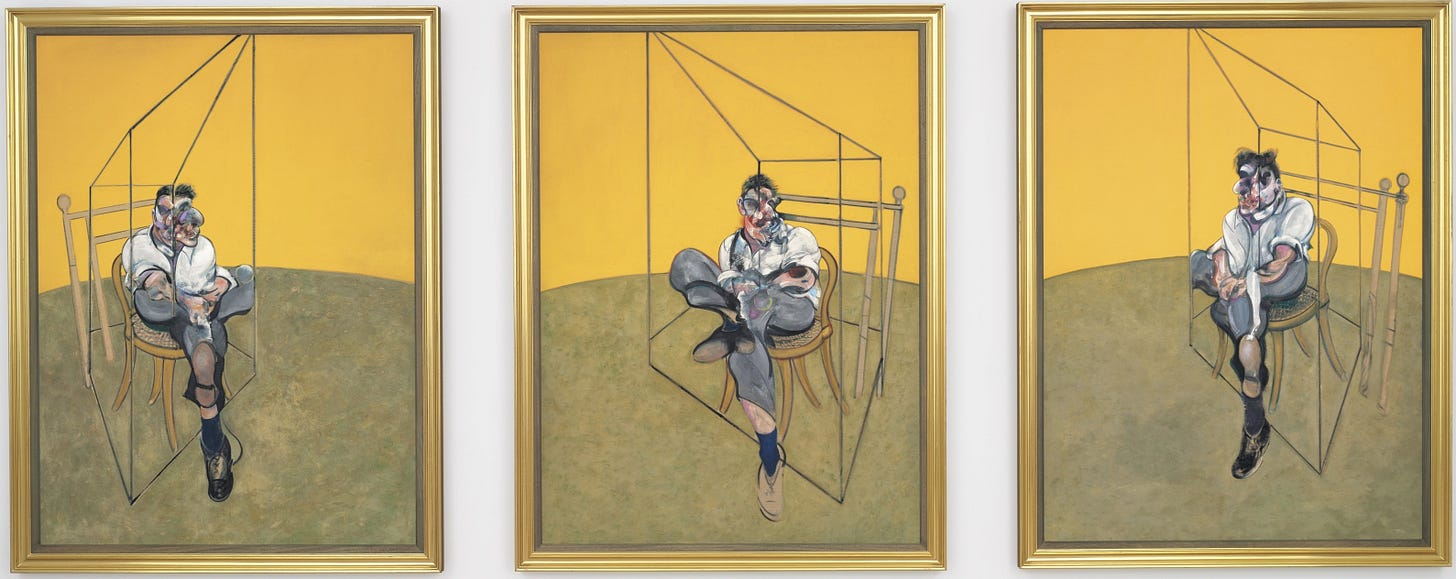
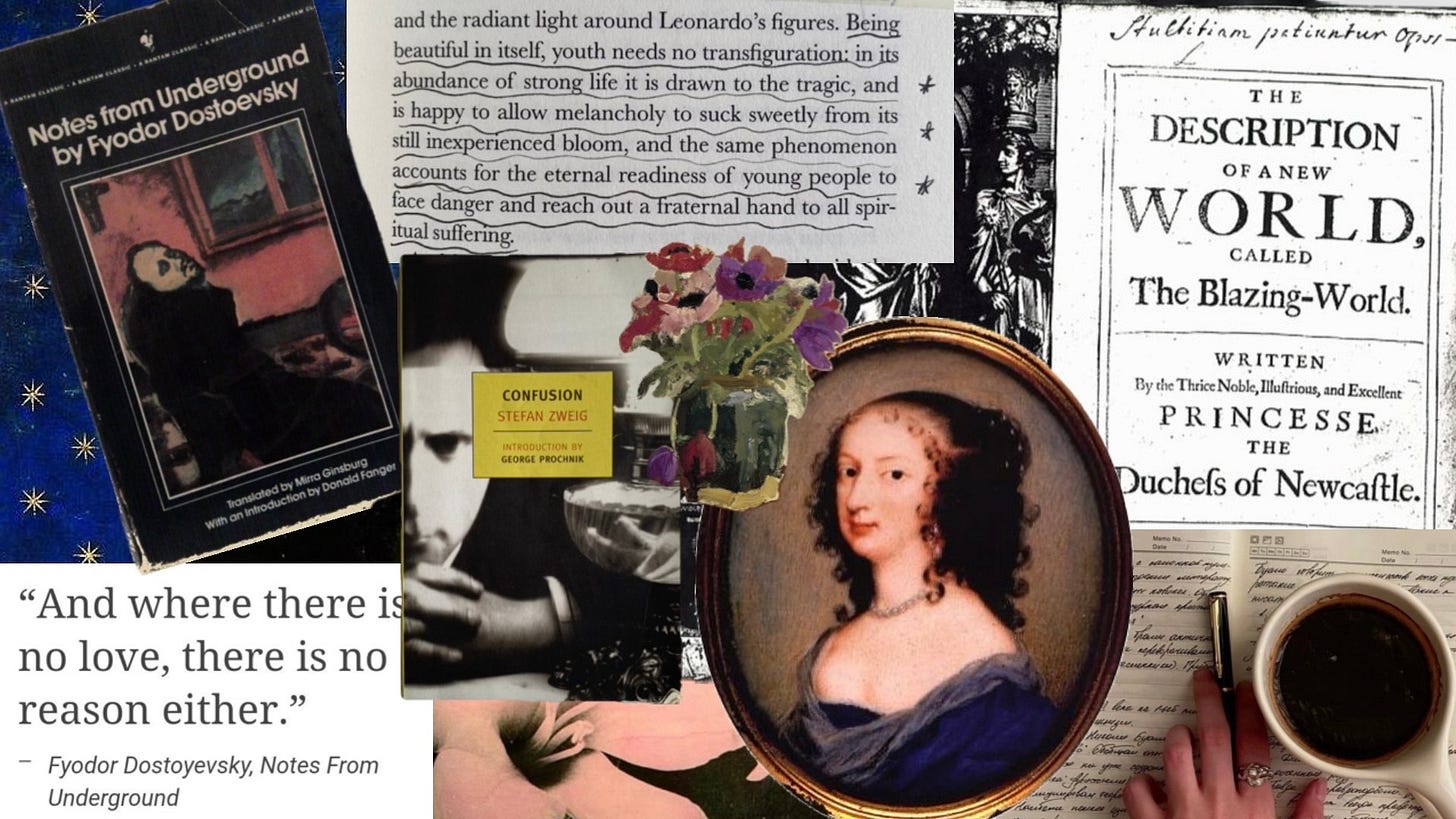
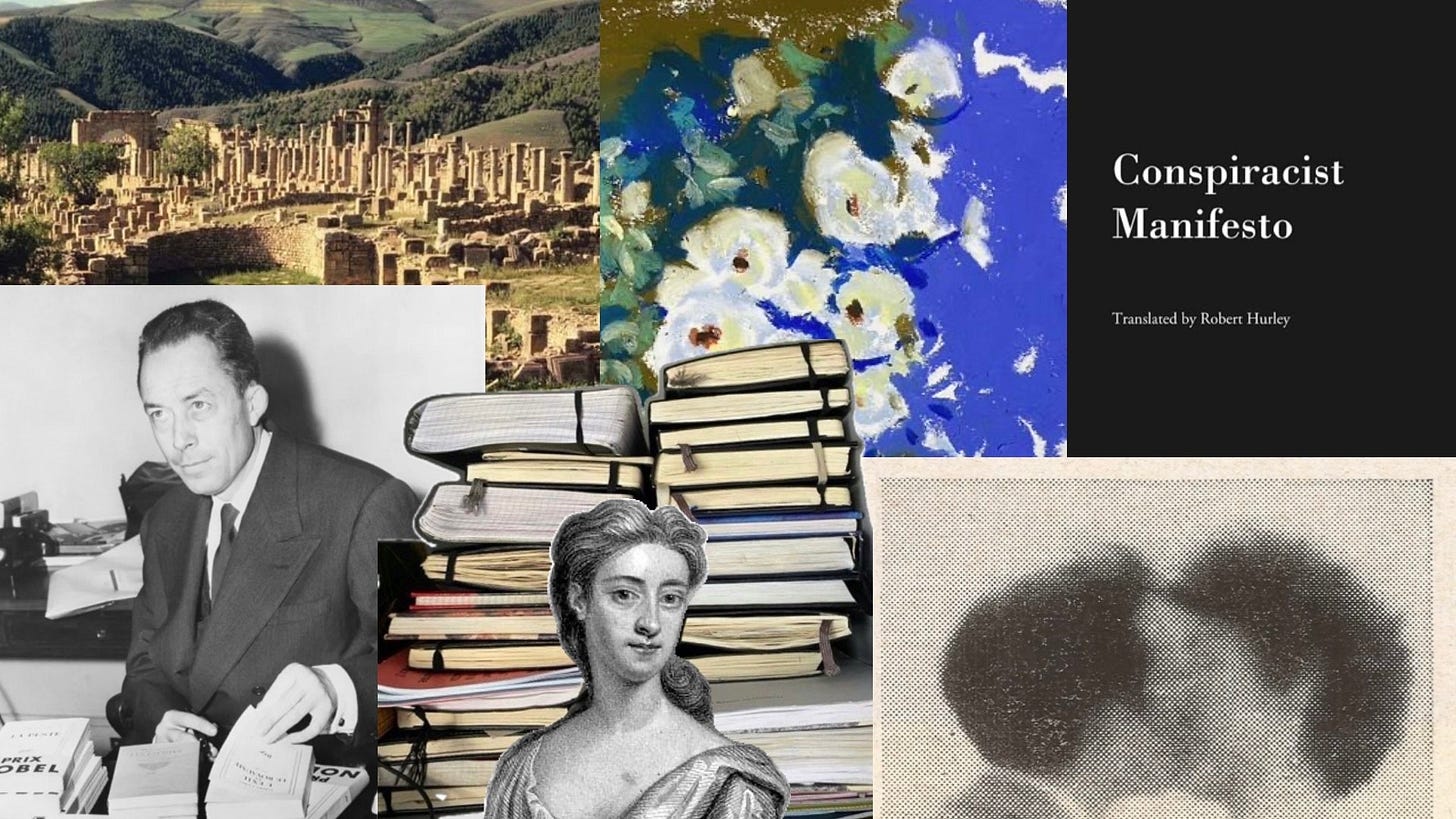
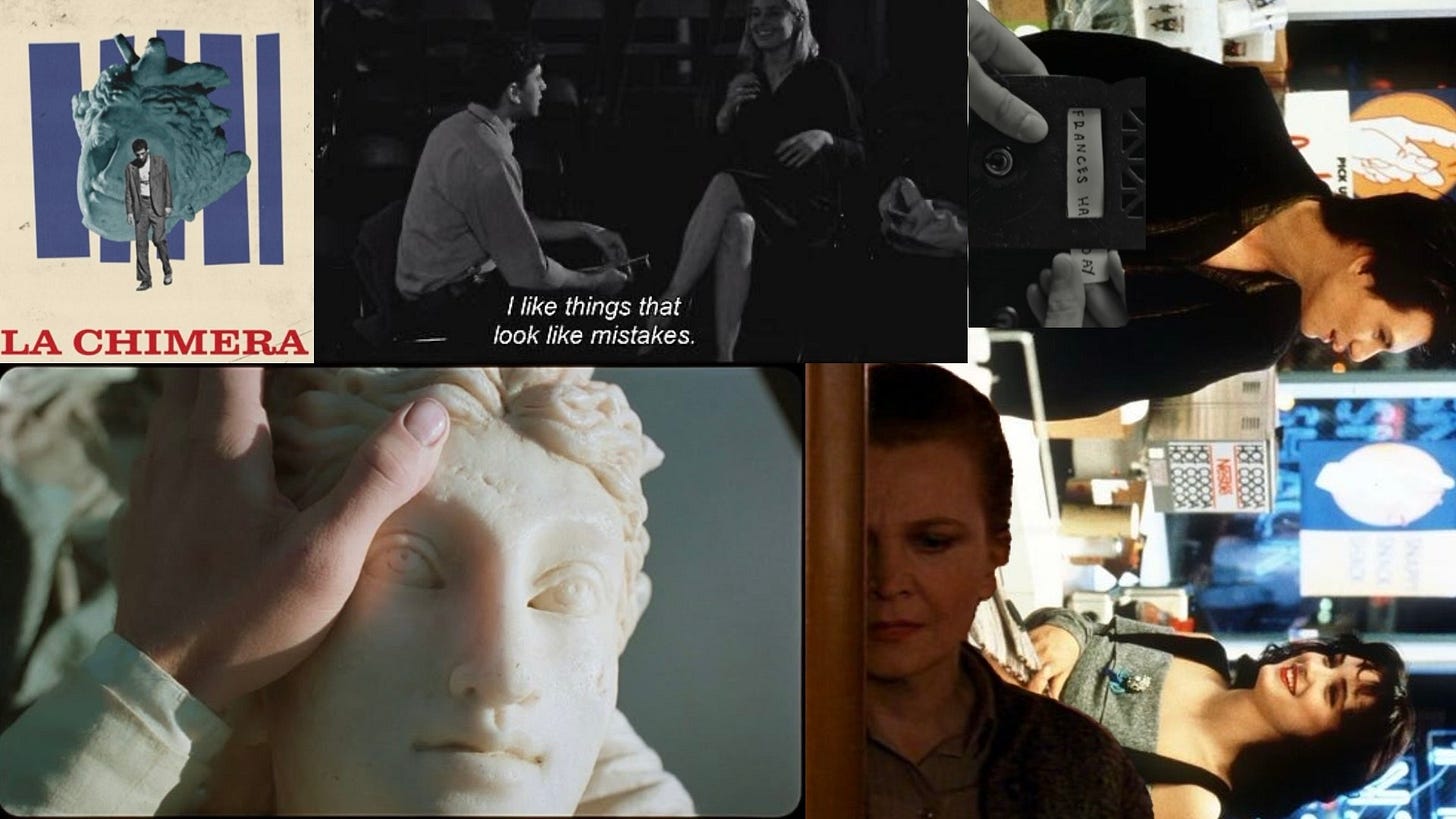
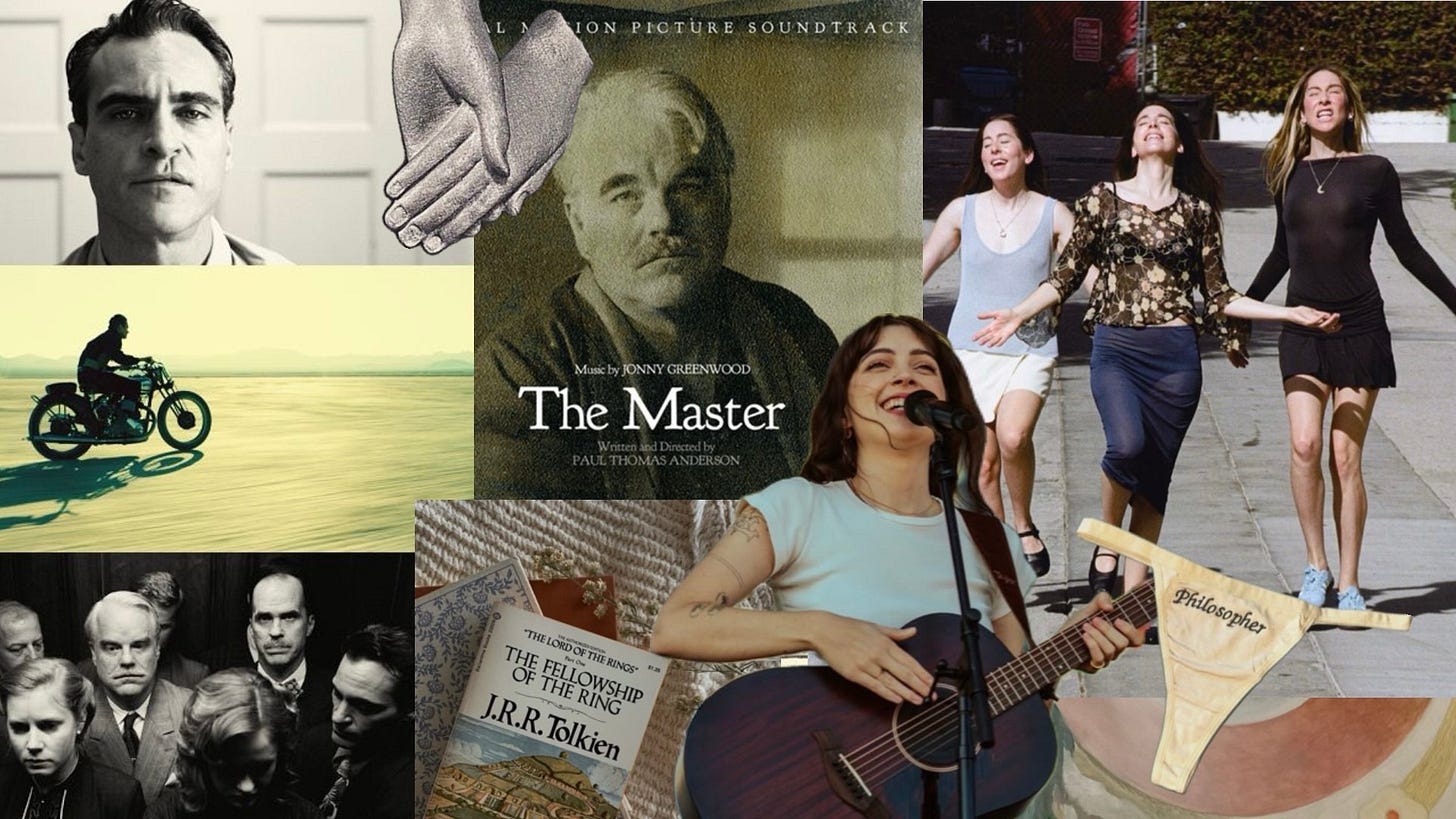


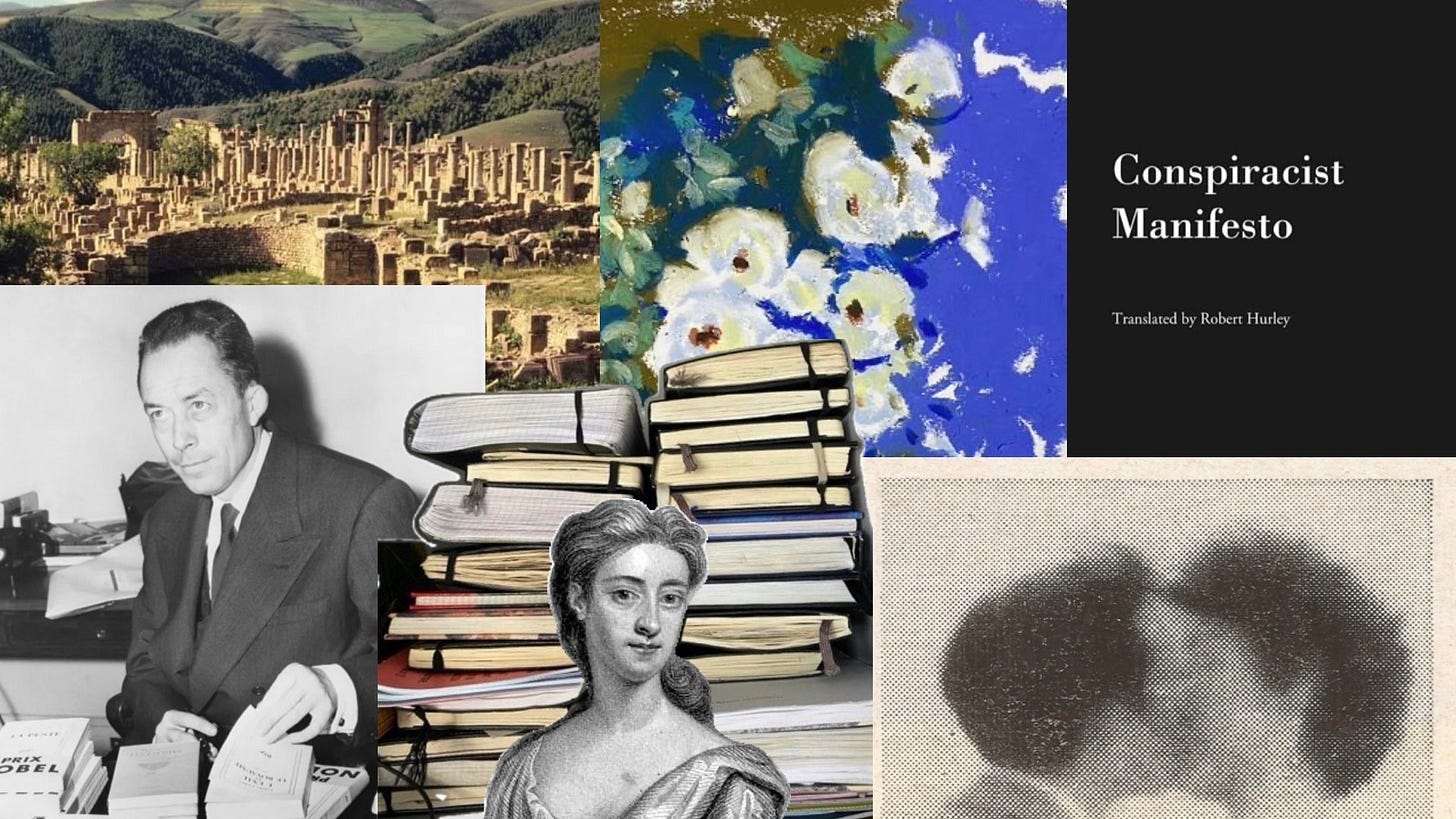
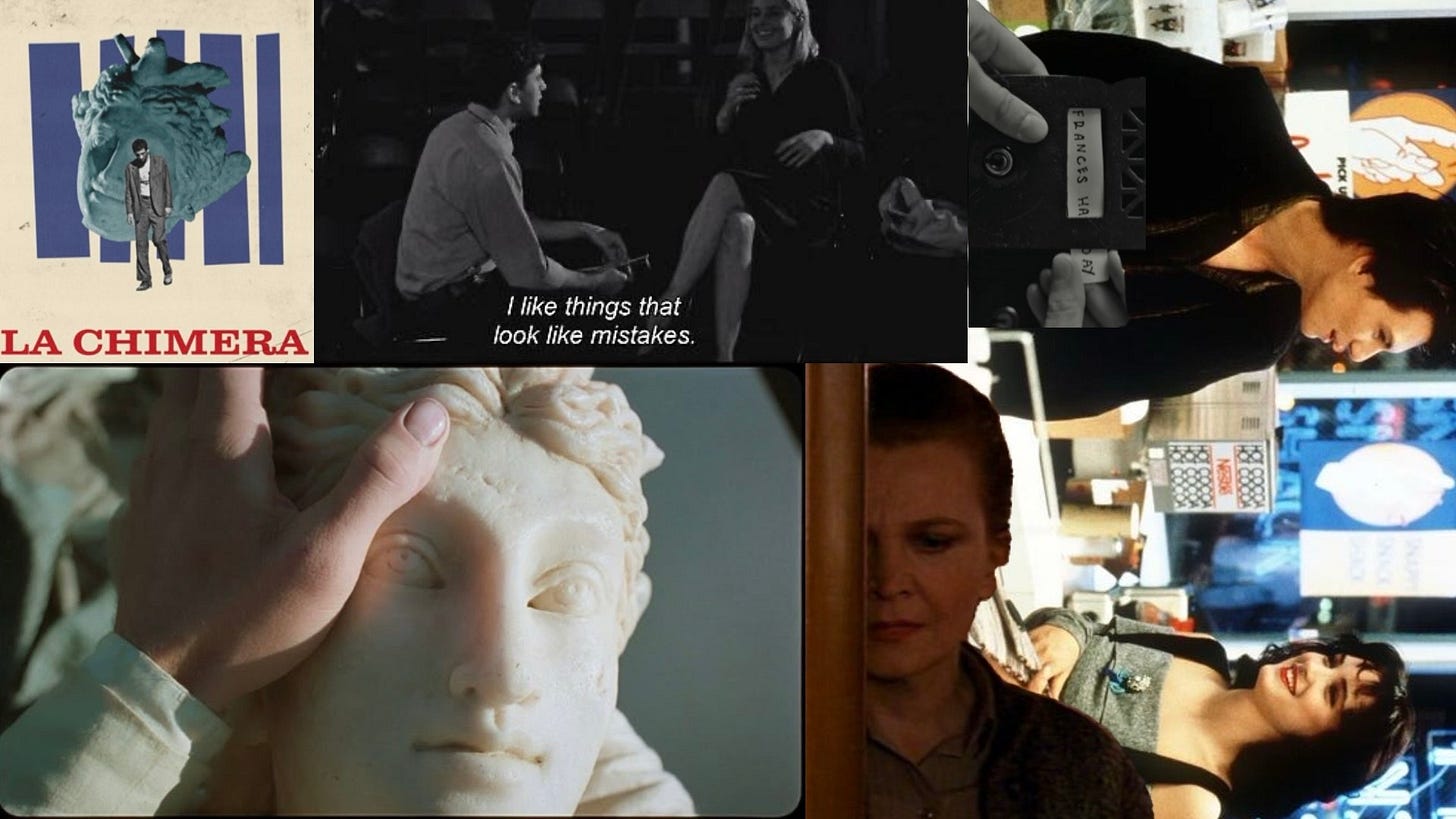

Me escapam palavras para descrever como eu me sinto lendo essa newsletter! Não que seja falta de vocabulário, é que a intensidade da admiração me tira a lógica...sério, esse é meu recanto favorito! <3
Have added La Chimera to my Movies to Watch list